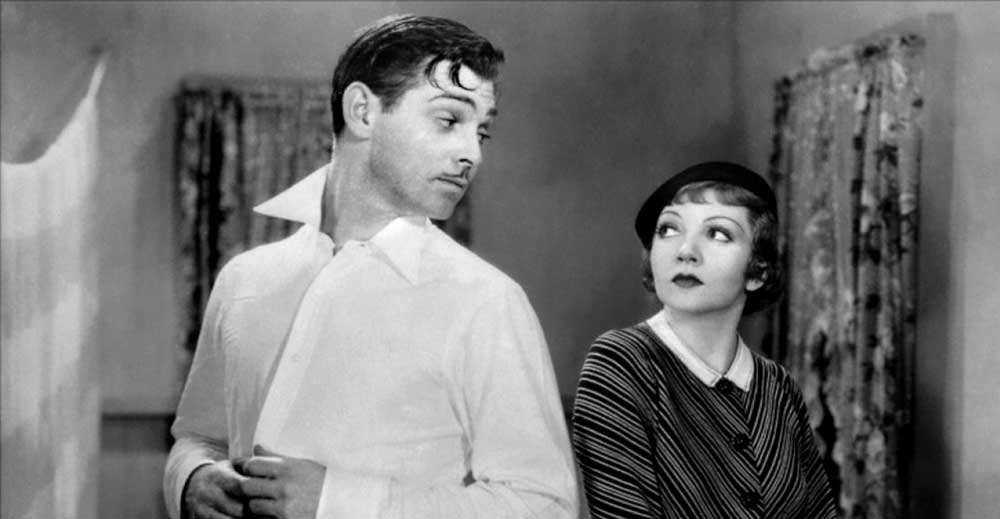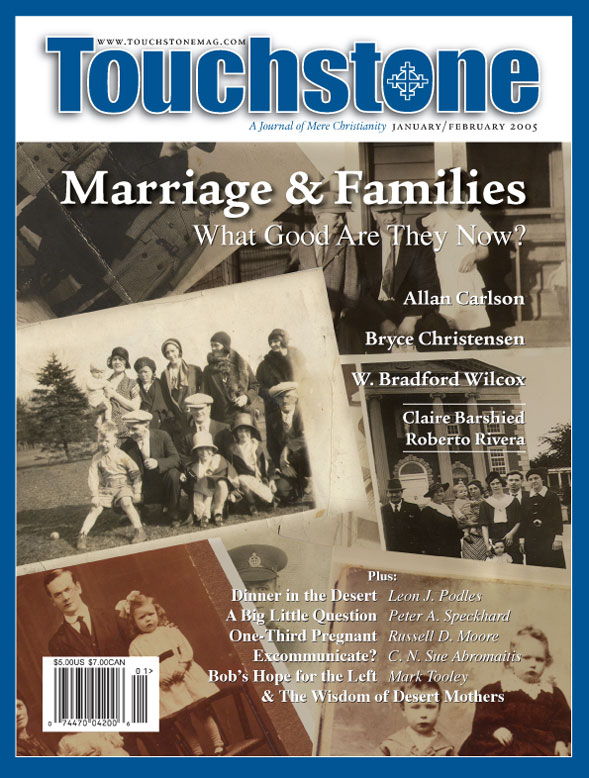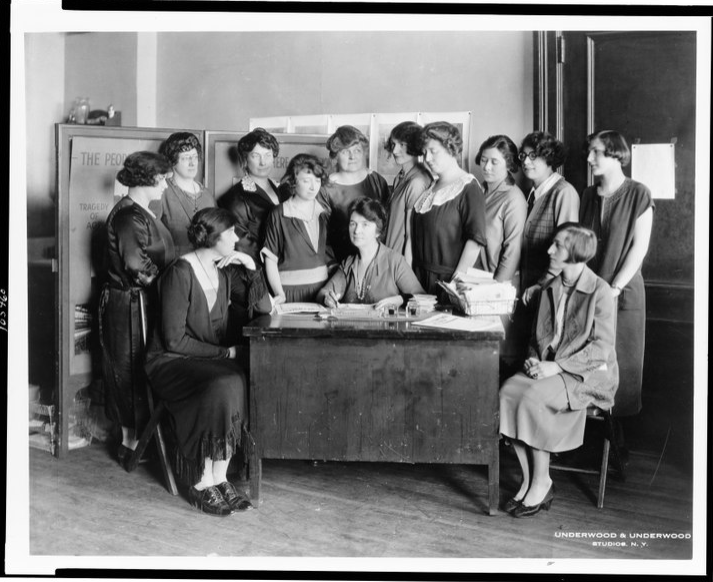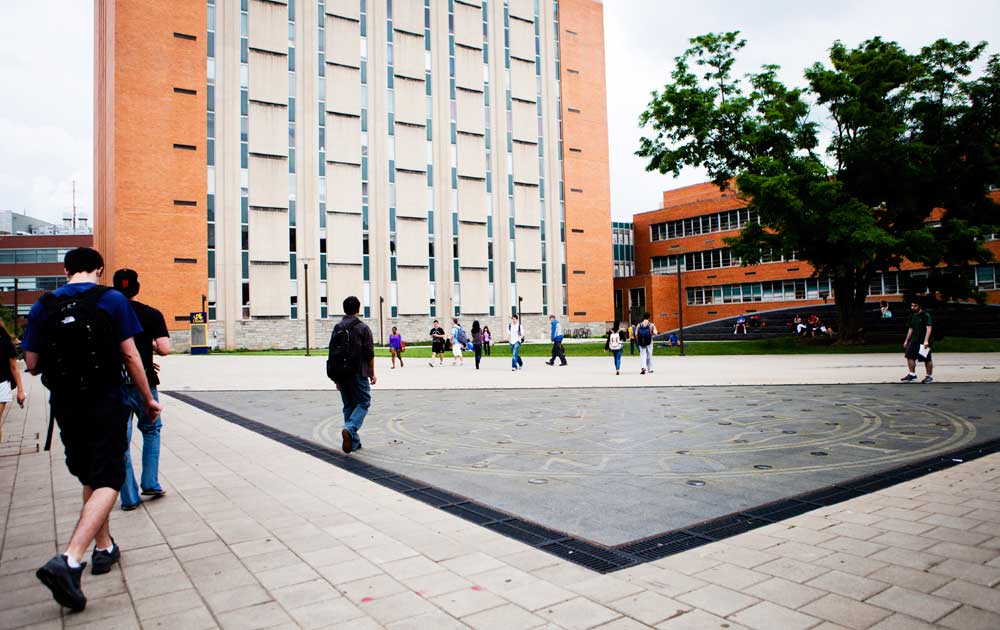Desperate Steps for Wives
Roberto Rivera on Television Wives & Suburban Choices
Given the evanescence of most mass culture, a sudden change in the fortunes of the companies that create and market the stuff shouldn’t come as a surprise. Still, ABC’s rise in the ratings is, in the words of everyone’s favorite breathy, machine-like voice, “impressive, most impressive.” Its “reality show,” Extreme Makeover: Home Edition, attracted nearly as many viewers as CBS’s Survivor. Lost, its atmospheric, slightly disorienting drama about the unlikely survivors of a horrific plane crash, is building not so much an audience as a cult, with me as one of the adherents.
But the undisputed jewel in ABC’s tiara is Desperate Housewives. Last Sunday, it drew 25 million viewers, which left it, in the words of Lisa de Moraes of the Washington Post, “breathing down the neck of CBS’s CSI.” Desperate Housewives is about the residents of “Wisteria Lane,” an idealized-to-the-point-of-irony suburban enclave. While all of Wisteria Lane’s denizens can be called “desperate,” each of them is desperate in her own way.
There’s Susan (Teri Hatcher), a single mom whose husband left her for another woman and then had the nerve to quote Woody Allen—“the heart wants what it wants”—as justification for his actions. Bree (Marcia Cross) is an almost pathological perfectionist with eyebrows that are, if such a thing is possible, even scarier than Nicole Kidman’s.
Lynette (Felicity Huffman) is a former career woman with four kids under the age of six, including twins who, instead of Ritalin, need Versed. Finally, there’s Gabby (Eva Longoria), a former model who married a man who promised her “everything [she] always wanted.” When she realized that she “wanted the wrong things,” she punished the fiend for keeping his promise by having an affair with the teenaged gardener.
A term that keeps coming up in discussions of Desperate Housewives is “post-feminist.” Does anyone know what that means? I don’t. The same term was applied to Ally McBeal, whose titular character was a single, neurotic, promiscuous, professional woman living in a big city (Boston). A term so broad that it encompasses both a thing and its near-opposite isn’t very useful. A more promising approach, if we can avoid making it sound like a conspiracy, begins with noting that several of Desperate Housewives’ creators are gay men.
Desperate Sexuality
In his essay about HBO’s Sex and the City, Lee Siegel, the New Republic’s television critic, called that show, whose creators were also gay men, an “ingenious affirmation of a certain type of gay-male sexuality.” The sexuality, and, by extension, the “relationships” that flowed from it, wasn’t domesticated, committed, and “safe,” i.e., the kind that reassures heterosexuals. Instead, it was “raw, rough, promiscuous, [and] anonymous.” That young women saw themselves in the antics of Sex and the City’s Bradshaw and company was “the biggest hoax perpetrated on straight single women in the history of entertainment.”
Maybe, just maybe, something similar is going on in Desperate Housewives. Perhaps all of the “desperation” reflects the creators’ own misgivings about domesticity and the consequences of taking “forsaking all others” and “until death do you part” seriously. Notwithstanding all the rhetoric about loving and stable relationships, there isn’t any substantial evidence of a strong desire on the part of most gay men to marry and start families.
Even champions of same-sex marriage like Andrew Sullivan acknowledge that the gay (as distinct from lesbian) take on “forsaking all others” differs from what our wives would consider an acceptable interpretation of that phrase. Perhaps that take is reflected in the program’s perspective on marriage. Then again, to paraphrase another former HBO headliner, that’s just my speculation. I could be wrong.
What isn’t speculative is that Desperate Housewives follows in a fifty-year-old tradition of depicting suburban life, especially the lives of suburban women, as a barren wasteland. It’s a place where intelligent and capable women like Lynette wither away into madness and inconsequentionality. (Okay, I made that last word up.) This sentiment helped spawn American feminism. Graduates of Seven Sisters schools, who were among the first American women to live in the suburbs following World War II, found themselves bored out of their minds. Their unhappiness and feelings of irrelevance became books like The Feminine Mystique.
Birdseye’s Housewife
I understand why that happened. Not for reasons having to do with feminism or “queer theory” but, rather, with a far better guide to Christian social thought, Marxism.
What I’ve seldom come across in all the discussions about the “plight” of the suburban housewife—apart from the work of Allan Carlson—is an acknowledgment of how new the idea of the housewife is. The “housewife,” as we understand this term, is largely a post-World War II phenomenon. While woman have, from time immemorial, worked at home, caring for children and relatives while performing domestic tasks, that’s not the same thing as being a housewife. For that, you need Clarence Birdseye and Marjorie Merriweather Post.
At the turn of the twentieth century, the average American woman spent between six and eight hours a day doing domestic tasks. Most of that time was spent in the planning and preparation of meals. By the eve of World War II, thanks to Birdseye’s invention and Post’s marketing, which included making refrigeration available to both merchants and consumers, that figure had been cut by more than half. By the 1950s, when refrigeration and other electrical appliances became standard equipment in most American homes, the average was approximately 90 minutes a day.
A New Creature
One result of this technology was the creature we call the American housewife. Anna Mason, wife of founding father George, ran the eighteenth-century equivalent of a Fortune 500 company, Gunston Hall. Thousands of employees, albeit nearly all unpaid, to supervise and accounts receivable kept her busy. The homes of our less glamorous nineteenth-century ancestors were also the sites of productive labor and places where the line between their efforts and the well-being of their families, especially their children, was bright.
Today, when, thankfully, most mothers don’t have to worry about their children’s physical survival, their contributions to the kids’ well-being are more intangible. This is especially true once the kids enter school.
Now “intangible,” notwithstanding what many empiricists might tell you, isn’t the same as “nonexistent” or “unimportant.” However, we live in a culture where an activity’s worth is measured in almost exclusively economic terms. (A well-intentioned but ultimately ironic example of this is the attempt to get stay-at-home moms covered under Social Security. Having time spent childrearing count towards accruing retirement credits requires assigning an economic value to what is, after all, done out of love. The same is doubly true of the related effort to include the unpaid work of caregivers in the Gross Domestic Product.)
It’s no surprise that so many American women feel a sense of, well, alienation. To this alienation then add the physical isolation of the typical American suburb. (A friend of mine pointed out that the driveways and sidewalks of Wisteria Lane are far more crowded than those of most real-world suburbs.) Unless the decision to stay at home is a consciously countercultural move, preferably one made within the context of a supportive community, even a cubicle will begin to look good.
Speaking of looking, you can see the beginning of an alternative. “A cloud as small as a man’s hand is rising from the sea”: the home-schooling movement. Even people who don’t have philosophical or cultural objections to the public schools are taking direct responsibility for the education of their children. Or, as Buffy Sommers put it, home schooling isn’t only for scary religious people anymore.
Home schooling, for those who can pull it off, can change the way we think about our homes and restore the brightness of that line connecting our efforts and the well-being of our families. (The same is true, albeit to a lesser extent, of working out of the home, which is probably why so many employers regard it with suspicion. After all, the last thing they want is for their people to be constantly reminded of what is, or at least should be, most important. It interferes with the quest for efficiency and productivity.)
And it’s seeing that line, not what you own or what your title is, that makes the difference between fulfillment and desperation.
Roberto Rivera is a Fellow at the Wilberforce Forum at Prison Fellowship. His work has appeared in Books & Culture, and he is also a regular contributor to the web magazine Boundless. He is a contributing editor for Touchstone.
subscription options
Order
Print/Online Subscription

Get six issues (one year) of Touchstone PLUS full online access including pdf downloads for only $39.95. That's only $3.34 per month!
Order
Online Only
Subscription

Get a one-year full-access subscription to the Touchstone online archives for only $19.95. That's only $1.66 per month!
bulk subscriptions
Order Touchstone subscriptions in bulk and save $10 per sub! Each subscription includes 6 issues of Touchstone plus full online access to touchstonemag.com—including archives, videos, and pdf downloads of recent issues for only $29.95 each! Great for churches or study groups.
Transactions will be processed on a secure server.
more from the online archives

27.6—Nov/Dec 2014
Tales of Forbidden Stereotypes
Real-Life Men & Women & the Tragic Loss of Human Comedy by Anthony Esolen
calling all readers
Please Donate
"There are magazines worth reading but few worth saving . . . Touchstone is just such a magazine."
—Alice von Hildebrand
"Here we do not concede one square millimeter of territory to falsehood, folly, contemporary sentimentality, or fashion. We speak the truth, and let God be our judge. . . . Touchstone is the one committedly Christian conservative journal."
—Anthony Esolen, Touchstone senior editor









